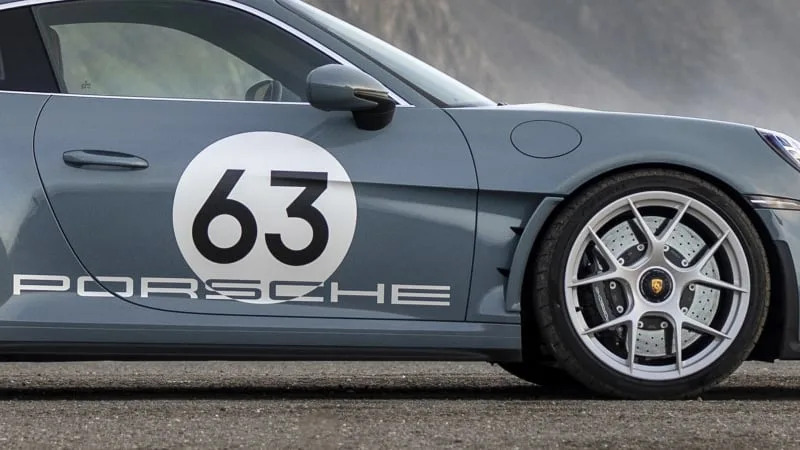NAPA, Calif. – Even without the S/T on the roster, one could reasonably assume that there’s already a new Porsche 911 out there that suits the needs of any would-be buyer. There are currently more than two dozen permutations of the 992-generation sports car on sale, and with special enthusiast-focused models like the Carrera T, Dakar, and Sport Classic peppered throughout the lineup, Porschephiles aren’t exactly hurting for choice at the moment.
At a glance, the Porsche 911 S/T could easily be dismissed as “just” a GT3 Touring that’s been outfitted with a six-speed manual gearbox and the engine from a GT3 RS, a powertrain combination that hasn’t been available since the tail end of the 997 generation’s production run. Even if that’s all it was, it would be cause for some celebration. The GT3 RS’ naturally aspirated 4.0-liter flat-six dishes out 518 horsepower and boasts a soaring 9,000 RPM redline, while the GT3’s six-speed gearbox is one of the most well-sorted manual transmissions available anywhere. Yet, there’s a lot more to the S/T; it’s an instant classic that’s the ultimate form of 911 fan service.
Developed to celebrate the 60th anniversary of the 911’s debut, the limited-production S/T brings together a unique blend of hardware from the track-tuned GT division cars – as well as some key components that were designed specifically for the S/T – to create what Porsche considers to be the most driver-focused 992 yet. The S/T name is a reference to a racing version of the 911 S from the nameplate’s earliest days. Internally known as the ST and first offered in 1969, the package included modifications to the chassis, engine and body to improve performance, but it lacked the large rear wing and the other aerodynamic elements that would later help to define iconic track-tuned 911s like the Carrera RS 2.7.
If that sounds a lot like the modern-day GT3 Touring, which is essentially a standard GT3 without the big rear wing, you’re not wrong. The S/T just takes the concept a lot further, amplifying the cognitive dissonance of a 911 engineered for the track but intended for the road. It may be injected with motorsports technology, lightweighted and tuned to feel more feral, but it’s also better suited to the pace and circumstances of backroads rather than closed courses. For those who prioritize a savagely unfiltered canyon-carving experience over potential lap time bragging rights, this is your GT3.

911 S/T and 911 GT3 Touring
The overarching theme of the S/T is a back-to-basics approach to involvement and overall performance, and it’s achieved through myriad small tweaks rather than a few big ones. For example, the height of the shift lever was reduced by 10mm versus the GT3, resulting in noticeably shorter throws, and the final drive ratio was shortened by 8%, which equates to quicker acceleration and more frequent shifting.
The GT3’s dampers were retuned for S/T duty as well, resulting in a suspension that absorbs mid-corner bumps at road-going pace rather than bouncing over them, alongside better overall ride quality. The GT3 Touring’s rear-steer setup was ditched, and the S/T’s steering rack was revised to accommodate the change. Porsche has also tossed the steering wheel-mounted drive mode selector, opting instead to pare the user-controlled adjustments down to what the driver can individually select via dedicated switches on the center stack: damper stiffness, exhaust volume, stability and traction control, and auto rev-matching.
But what really defines the S/T is the commitment to lightweighting. Porsche’s efforts go several steps further than a GT3 Touring, and not only does it result in a curb weight of 3,056 pounds, making this the lightest 992-generation 911 road car thus far (the GT3 weighs 167 more), it also gives the S/T character that’s unlike anything else in the range.


The diet is evident from the exterior, which sports the carbon fiber doors and consequent 991-style door handles of the GT3 RS, as well as similarly side-vented front fenders. S/T-specific magnesium wheels are also on hand to reduce rotating mass, while a small Gurney flap compliments the retractable rear spoiler to help reduce aerodynamic lift. The theme continues inside, which feels even more stripped-down and focused than the GT3 Touring’s interior thanks to subtle but meaningful touches like the carbon fiber door grab handles and the fabric door opener loops.
The full extent of the work really only becomes clear once you’ve brought the engine to life. The S/T has significantly less sound deadening material than a GT3 Touring, which already has significantly less sound deadening than a standard 911. You hear everything: the low-RPM chatter of the flat-six’s inner workings as you tip into the throttle; the distinct change in the drivetrain’s clamor as the clutch is engaged and disengaged. At speed, the exhaust note is so all-encompassing that it’s genuinely difficult to discern any difference between the system’s two settings.
It’s not going to be for everyone – this is undoubtedly one of the loudest cabins I’ve ever experienced in a production car. But the racket makes the S/T feel alive in a way that few modern cars do, ushering in credible motorsport vibes without encumbrances like roll cages and harnesses that typically come along with them. It’s an experience best taken in measured doses, though, and thankfully things do quiet down substantially when you settle into sixth gear on the highway.
While I wouldn’t really consider this a tourer, the carbon seats that come standard in the S/T are arguably the most ergonomic and well-designed OE buckets available anywhere. Even though the only adjustments available are fore/aft and height, you never really feel like you need anything else to find the perfect driving position, and they’re surprisingly comfortable during longer stints considering how aggressively bolstered they are.

To get a clearer understanding of the differences between the two, I drove a GT3 Touring back-to-back with an S/T while hustling down some damp, winding roads in wine country. From a dynamic standpoint, the S/T’s suspension revisions and shorter gearing are the most immediately obvious differences. The GT3 Touring is stiffer, yet the powertrain’s response seems almost lethargic by comparison; the latter sense driven home by the S/T’s new clutch and flywheel assembly, which weighs half as much as the GT3’s and allows the flat-six to sweep through the RPM range with race car-like urgency during downshifts. Make no mistake, the GT3 Touring is a fantastic sports car, but it feels like a bit of an afterthought versus the standard GT3. The S/T is a wholly realized vision for a road-focused, GT3-based 911.
At $291,650, the S/T is the most expensive 911 on sale today, commanding more than $100,000 over the base price of a GT3 Touring and $50,000 more than a GT3 RS. Although there’s an argument to be made that it can’t be worth that much more, Porsche chose to focus largely on nuance and sensations with the S/T rather than headline-grabbing statistics, meaning the benefits are harder to quantify. One suspects, however, that the price premium really comes down to exclusivity. Just 1,963 examples will be built in total, so there’s little doubt that they’ll be trading hands – after the scalper-deterring one-year required lease period is up – for quite a bit more after spending plenty of time parked in climate-controlled garages, not unlike wine in a cellar or a painting on a wall. It’s a depressing thought, to be honest.
At a moment in time when cars are getting heavier, quieter, and less involving by-design, the S/T is a love letter to drivers who consider the sensory experience to be a more valuable performance metric than being the fastest or the quickest. It’s for the people who go to sleep at night with exhaust notes looping in their minds; the ones who have a favorite corner on the stretch of tarmac where they go to disconnect from the noise of daily life.
Here’s hoping that some of the folks who are fortunate enough to put an S/T in their garage choose to throw caution to their portfolios and use this thing for what it was designed to do.
